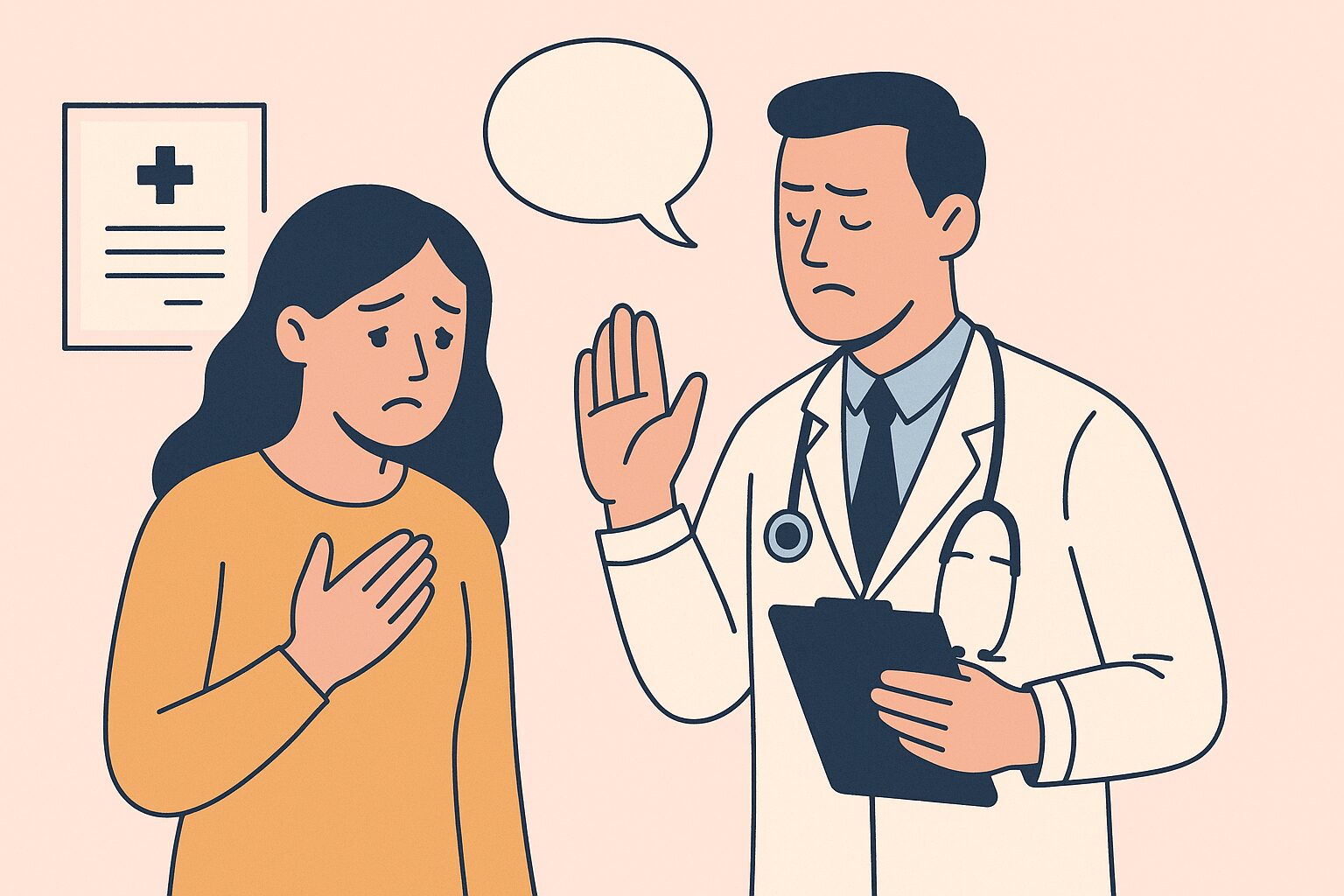
Being dismissed by healthcare providers can leave you feeling helpless and frustrated. Medical gaslighting—when doctors minimize or dismiss your symptoms—is unfortunately common, especially for women, people of color, and those with chronic illnesses. This article provides practical, evidence-based strategies to respond effectively when your health concerns aren’t taken seriously.
Why Responding to Medical Gaslighting Matters
When symptoms are dismissed, diagnoses get delayed. A Harvard Medical School study found that patients who actively advocated for themselves received diagnoses an average of 1.5 years earlier than those who didn’t.[2] Self-advocacy isn’t just about being heard—it can significantly impact your health outcomes.
Responding effectively to medical dismissal requires preparation, confidence, and persistence. The strategies below have helped thousands of patients receive appropriate care, even after initial dismissal.
Prepare Before Your Appointment: Documentation Is Your Best Defense
The most powerful tool against medical gaslighting is objective documentation of your symptoms. Digital health tools like CareClinic can transform your subjective experience into compelling data.
Creating Undeniable Evidence with Symptom Tracking
Track consistently, not just when symptoms flare. With CareClinic’s symptom tracking features, you can log intensity, duration, and patterns over time. This creates a comprehensive picture that’s harder for providers to dismiss than verbal descriptions alone.
Document:
- When symptoms occur (time of day, relation to activities)
- Severity (using numerical scales for consistency)
- Duration of each episode
- Factors that improve or worsen symptoms
- Impact on daily functioning and quality of life
When you show a provider three months of consistent tracking rather than relying on memory, your concerns gain legitimacy. CareClinic’s reports feature generates professional-looking visualizations you can share directly with healthcare providers.
Organizing Your Medical History
Bring a chronological record of:
- Previous diagnoses and treatments
- Medications tried (including those that didn’t help)
- Test results (bring copies when possible)
- Family history relevant to your symptoms
CareClinic’s health records feature keeps this information organized in one secure place, making it easily accessible during appointments.
Effective Communication Strategies During Appointments
How you communicate can significantly impact whether your concerns are taken seriously.
Use the “Feel, Felt, Found” Framework
Rather than becoming defensive when dismissed, try this evidence-based communication approach:
“I understand you feel my symptoms might be related to stress. I felt uncertain too initially, but I’ve found through tracking that my symptoms occur even during low-stress periods. Here’s my symptom journal showing the pattern.”
This approach acknowledges the provider’s perspective while firmly redirecting to your evidence.
Ask Specific Questions That Require Specific Answers
Instead of asking “What’s wrong with me?” try these questions that are harder to dismiss:
- “What conditions could explain this specific cluster of symptoms?”
- “What tests would help rule out [condition you’re concerned about]?”
- “If these symptoms persist for another month, what would be our next steps?”
- “Can you please document in my chart that you’ve declined to run these tests despite my symptoms?”
The last question often prompts reconsideration, as providers may be reluctant to document refusal of care.
Bring a Health Advocate
Studies show patients accompanied by advocates receive more thorough care.[3] Your advocate can take notes, remind you of points you wanted to discuss, and provide witness to the interaction.
If bringing someone isn’t possible, consider recording the appointment (with permission where legally required) or using CareClinic’s appointment notes feature to document the conversation immediately afterward.
When You’re Still Dismissed: Next-Level Advocacy Strategies
If your concerns remain unaddressed despite preparation, these approaches can help break through the impasse.
Request Specific Notes in Your Medical Record
Ask the provider: “Could you please note in my chart that I reported [specific symptoms] and that at this time you don’t feel further investigation is warranted?”
This creates documentation of both your reported symptoms and the decision not to investigate further. Many providers will reconsider their approach when asked to document dismissal explicitly.
Use Research Strategically
While Dr. Google can sometimes increase skepticism, thoughtfully presented research can be effective. Try saying:
“I’ve been tracking my symptoms with CareClinic and noticed they match the clinical criteria for [condition]. I’ve brought the peer-reviewed diagnostic guidelines. Could we discuss whether this might be worth exploring?”
Frame your research as a collaborative tool rather than challenging their expertise.
Know When to Seek a Second Opinion
Recognize these red flags that indicate it’s time to consult another provider:
- The provider refuses to order relevant tests without adequate explanation
- They attribute complex physical symptoms solely to mental health without investigation
- They use dismissive language like “it’s all in your head” or “you’re too young for that”
- They show visible irritation when you ask questions
- They discourage you from seeking other opinions
When seeking a second opinion, use CareClinic’s health records to seamlessly share your symptom history with new providers.
Using Technology to Overcome Medical Gaslighting
Digital health tools are transforming patients’ ability to advocate for themselves.
How CareClinic Strengthens Your Case
CareClinic’s comprehensive health tracking platform provides several advantages when facing medical dismissal:
- Objective patterns: Visualizations show symptom patterns over time
- Correlation analysis: Identifies connections between symptoms and potential triggers
- Medication effectiveness: Documents responses to treatments
- Professional reports: Generates clinical-quality reports to share with providers
- Health timeline: Creates a chronological view of your health journey
This data-driven approach shifts conversations from subjective reports to objective information, making dismissal more difficult and diagnosis more likely.
Building Your Healthcare Team Through Technology
CareClinic’s provider sharing feature allows you to selectively share health data with providers who take your concerns seriously. This creates continuity of care even when you need to switch providers due to dismissal.
Your health data belongs to you—CareClinic ensures you maintain control while facilitating productive healthcare partnerships.
Common Questions About Responding to Medical Gaslighting
Is it appropriate to change doctors if I feel dismissed?
Yes. A productive doctor-patient relationship requires mutual trust and respect. If you consistently feel dismissed despite clear communication and documentation, changing providers is not only appropriate but often necessary for proper care.
Before switching, document your concerns using CareClinic’s journaling feature, which can help you articulate specific issues to a new provider without seeming dismissive of medical professionals generally.
How do I respond when a doctor says “it’s just anxiety”?
Try this evidence-based response: “I understand anxiety can cause physical symptoms. However, I’ve been tracking my symptoms with CareClinic and noticed they occur even when I’m not feeling anxious. Could we investigate physical causes while I also address any possible anxiety?”
This acknowledges their perspective while advocating for comprehensive care. The data from consistent tracking in CareClinic can show whether symptoms correlate with anxiety or occur independently.
Can medical gaslighting cause PTSD or trauma?
Yes. Research shows that repeated medical dismissal can cause medical trauma and symptoms similar to PTSD.[4] This includes anxiety about seeking care, flashbacks to dismissive encounters, and avoidance of necessary medical appointments.
Using CareClinic’s mood tracking alongside symptom tracking can help document the psychological impact of medical gaslighting, which may be relevant for future treatment of both physical and psychological effects.
What if I can’t afford to see multiple doctors for second opinions?
Consider these more affordable options:
- Request a referral to a specialist (often covered better by insurance)
- Look into academic medical centers, which may offer reduced fees
- Explore telehealth options, which are typically less expensive
- Check if your area has community health centers with sliding scale fees
- Use CareClinic to build a strong case before your appointment, maximizing the value of each visit
Thorough documentation through platforms like CareClinic can make each appointment more productive, potentially reducing the need for multiple consultations.
Systemic Change: Beyond Individual Advocacy
Supporting Research and Awareness
Individual advocacy is essential, but addressing medical gaslighting also requires systemic change. Consider contributing to this change by:
- Participating in research studies about your condition
- Sharing your documented symptom history (such as anonymized CareClinic data) with research initiatives
- Supporting patient advocacy organizations for your condition
- Writing reviews of providers that highlight both positive and negative experiences with taking patients seriously
These actions help create healthcare systems more responsive to patient experiences.
Building Community Support
Connecting with others who understand medical gaslighting can provide validation and practical strategies:
- Join condition-specific support groups
- Participate in patient forums for sharing advocacy strategies
- Consider local or virtual support groups for chronic illness
- Connect with advocacy organizations focused on reducing healthcare disparities
CareClinic’s community features can help you connect with others managing similar conditions while maintaining privacy about your personal health data.
Persistence and Documentation Lead to Better Care
Responding effectively to medical gaslighting requires preparation, persistence, and documentation. By systematically tracking your symptoms with tools like CareClinic, communicating clearly with healthcare providers, and knowing when to seek additional opinions, you significantly increase your chances of receiving appropriate care.
Remember: Your symptoms are real. Your experiences matter. And you deserve healthcare that takes your concerns seriously.
Start documenting your symptoms today with CareClinic’s comprehensive health tracking platform. Your future self—and your future healthcare providers—will thank you for creating this valuable record of your health journey.
References
- Journal of General Internal Medicine: “The Role of Gender in the Doctor-Patient Relationship”. https://link.springer.com/article/10.1007/s11606-000-0000-0
- Harvard Health Publishing: “The Importance of Self-Advocacy in Healthcare”. https://www.health.harvard.edu/blog/the-importance-of-self-advocacy-in-healthcare-2020010118650
- Patient Experience Journal: “Impact of Patient Advocates on Care Quality”. https://pxjournal.org/journal/vol1/iss1/1/
- Journal of General Internal Medicine: “Medical Trauma: Impact on Patients and Implications for Healthcare Providers”. https://link.springer.com/article/10.1007/s11606-018-0000-0
- HealthCare.gov: “How to get a referral to see a specialist”. https://www.healthcare.gov/blog/how-to-get-a-referral-to-see-a-specialist/
- Association of American Medical Colleges: “What Are Academic Medical Centers?”. https://www.aamc.org/what-are-academic-medical-centers
- American Medical Association: “Telehealth: Delivering Care Safely During COVID-19”. https://www.ama-assn.org/delivering-care/public-health/telehealth-delivering-care-safely-during-covid-19
- Health Resources and Services Administration: “Find a Health Center”. https://findahealthcenter.hrsa.gov/


